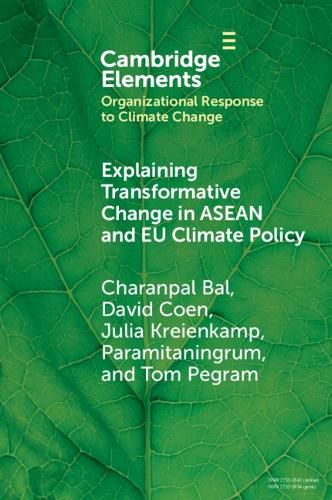Readings Newsletter
Become a Readings Member to make your shopping experience even easier.
Sign in or sign up for free!
You’re not far away from qualifying for FREE standard shipping within Australia
You’ve qualified for FREE standard shipping within Australia
The cart is loading…






The Paris Agreement embodies a flexible approach to global cooperation, aimed at encouraging ever more ambitious climate action by a variety of players on all levels of governance. Regional organizations play an important role in mobilizing such action. This Element provides novel insights into the conditions under which policy entrepreneurs can bring about transformative policy change in regional settings, with a focus on the European Union (EU) and the Association of Southeast Asian Nations (ASEAN). It finds that opportunity structures in the EU have been conducive to successful climate-progressive policy entrepreneurship at several key junctures, but not consistently. In contrast, the ASEAN governance context provides few access points for non-elite interests, making it fiendishly difficult for policy entrepreneurs to push for substantive policy change in the face of powerful domestic veto players. This title is also available as Open Access on Cambridge Core.
$9.00 standard shipping within Australia
FREE standard shipping within Australia for orders over $100.00
Express & International shipping calculated at checkout
The Paris Agreement embodies a flexible approach to global cooperation, aimed at encouraging ever more ambitious climate action by a variety of players on all levels of governance. Regional organizations play an important role in mobilizing such action. This Element provides novel insights into the conditions under which policy entrepreneurs can bring about transformative policy change in regional settings, with a focus on the European Union (EU) and the Association of Southeast Asian Nations (ASEAN). It finds that opportunity structures in the EU have been conducive to successful climate-progressive policy entrepreneurship at several key junctures, but not consistently. In contrast, the ASEAN governance context provides few access points for non-elite interests, making it fiendishly difficult for policy entrepreneurs to push for substantive policy change in the face of powerful domestic veto players. This title is also available as Open Access on Cambridge Core.